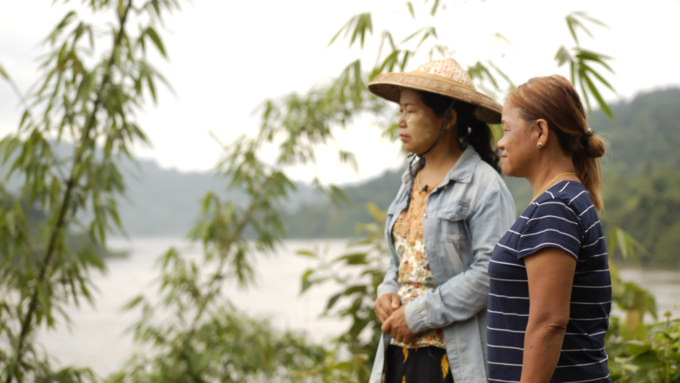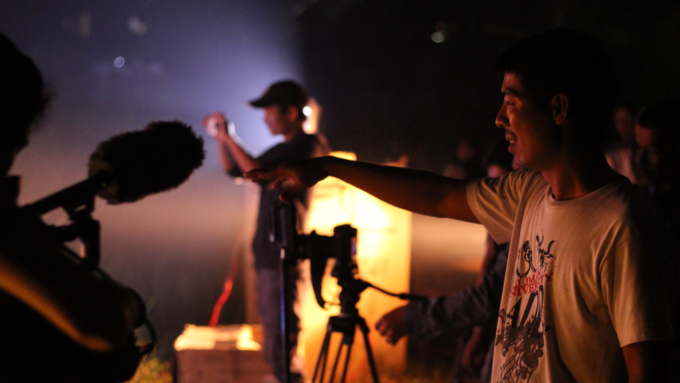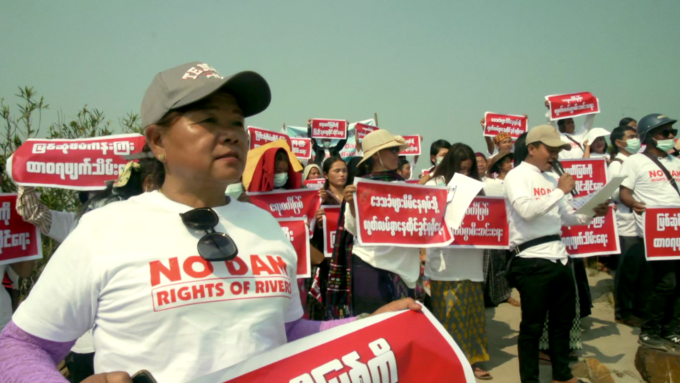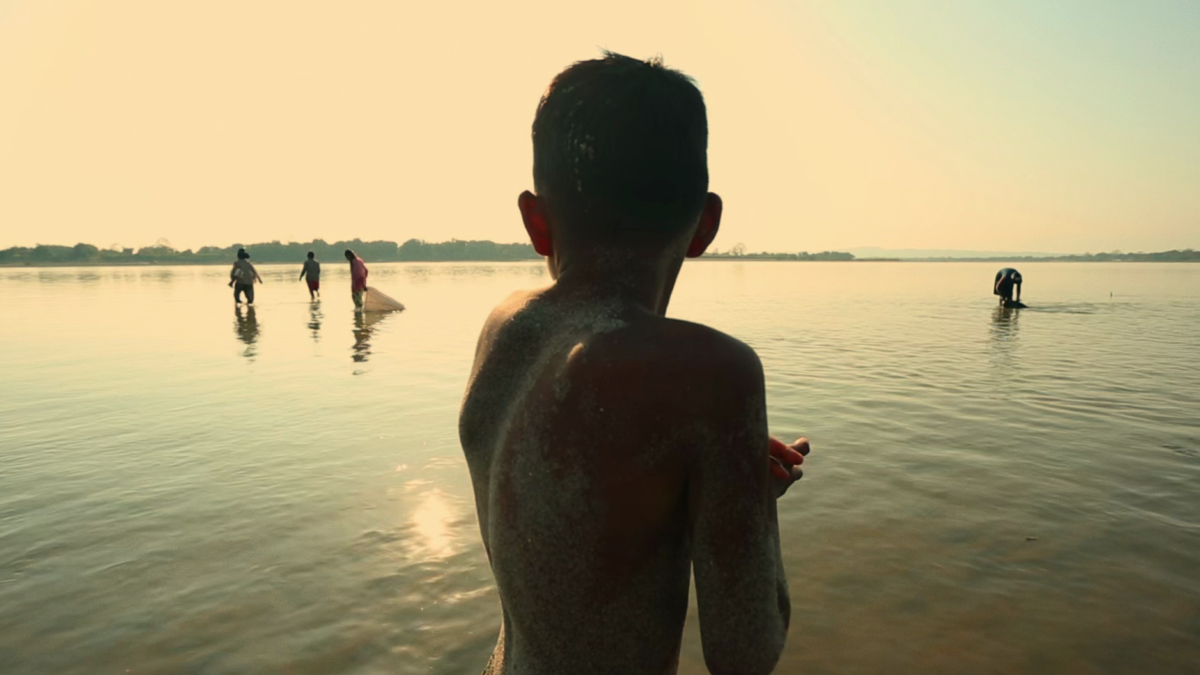Discovering Myanmar’s struggle against the Myitsone Dam through grassroots activists and the lens of director Emily Hong
Nestled between the Mali Hka and N’Mai Hka rivers lies a village once home to Hkawn Mai, Lu Ra, and Ja Hkawn. Emily Hong’s “Above and Below the Ground” unfolds in this serene setting, capturing life’s essence through a poignant lens. The film begins with an intimate baby naming ceremony, echoing a profound connection to nature: “To all living beings in the ocean and sky, to all that crawl above the ground, he is now introduced to the world.” As life’s complexities unfold, Hong’s documentary challenges the typical narrative, steering away from white saviors or Asian villain/ victim stereotypes. Focused on the Myitsone Dam in Myanmar, the film delves into political intrigues and the relentless activism of Indigenous punk rock band BLAST alongside the women activists. Against the backdrop of Aung San Suu Kyi’s unfulfilled promises and a looming military coup, these activists employ protest, prayer, and Karaoke music videos in a powerful resistance.

The construction of the Myitsone Dam concluded during the tenure of the then-Chinese President Hu Jintao and Myanmar’s military junta leader, U Than Shwe. Since 2000, the negotiation process has been marked by numerous twists and turns. Primary controversies within the project revolve around concerns regarding environmental preservation, unequal distribution of benefits, and political tensions involving China and Western countries. Like many other developing nations, Myanmar, burdened by substantial debt, faces a crucial choice between pursuing economic development or addressing human rights issues. Until 2010, China consistently provided financial aid and military support to the military government. However, as Myanmar began transitioning towards democracy, local sentiments of nationalism and opposition to China gradually gained traction.
“This film really started when I heard about BLAST music, and that Karaoke music video album is what sparked the first country wide environmental movement in Burma,” said Hong in the Q&A session of Philadelphia Asian American Film Festival. In Kachin state, the northern part of Myanmar, the indigenous Christian minority safeguard the language and culture. Awng Lum, not only a pastor that serves at Alam Baptist Church but also a member of BLAST, works along with Seng Ni and Li Li to create music that ignites native consciousness. The price of creative freedom is that they were always on alert with their bags packed, since during the military regime, dissenting voices couldn’t filter through the censors.

While we follow Hong’s lens and dive deep into the story, it is impossible for one to forget the contrast between a well-known human rights advocate like Aung San Suu Kyi and a group of self-help indigenous women like Hkawn Mai, Lu Ra, and Ja Hkawn. The juxtaposition of Aung San Suu Kyi and Lu Ra emerges constantly: the former, a Nobel Peace Prize awardee, once promised to prevent the construction of the Myitsone Dam and make information transparent during the National League for Democracy campaign, but she broke her promise after winning the election. On the other hand, Lu Ra and other villagers’ situation is tougher due to poverty and the lack of educational opportunities, but they never stop fighting.
“We have been living in Aungmyintha relocation village since 2011,” Ja Hkawn says, pointing out that the materials of the buildings in Aungmyintha are not stable. Once they start to protest against the Dam, China Power Investment Corporation will cut their rice rationing, leading to the death of many villagers due to barrenness. It’s difficult to tell which is harder: to go against audacious China and the military junta, or to witness your goddess fall off the altar.
“Kaw Kaw, because of you, my heart is broken. Kaw Kaw, my life is ruined by trusting your words…You abandoned me when you were happy. You left me when you were successful…”
To add insult to injury, we encounter the darkest night throughout the film: BLAST is working on this political allegory piece, “Kaw Kaw” (the oldest daughter,) in the recording booth while they learn that Li Li needs to go through surgery, which might render him no longer able to sing.
Fortunately, upon closer observation, beams of sunlight reveal themselves in every corner. The charm of this piece stems from both Hong’s serene directorial approach and the positive spirit embodied by the protagonists. As the film nears its conclusion, Hkawn Mai, the youngest protagonist, sets out on her educational journey to Bangkok, carrying with her the enduring essence of their shared experiences — a journey undertaken with the intent to return and safeguard her home. Just as we accompany these resilient activists on their transformative journey, “Above and Below the Ground” concludes on an open yet optimistic note, emphasizing the conviction that the upcoming generation will shoulder the responsibility of indigenous self-determination.

Hong encapsulates not merely an individual endeavor but the essence of collaborative work within a transnational film team, contributing to the broader movement aimed at decolonizing documentary practices. In this pursuit, the piece leverages the distinctive potential of ethnographic film to foster spaces for intercultural exchange, collaboration, and accountability. The future appears bright as the spirit of empowerment and collaboration continues to pave the way forward.
Postscript
“Above and Below the Ground” kicked off the 2023 Philadelphia Asian American Film Festival on November 2nd and co-screened with the first episode of “Taking Root: Southeast Asian Stories of Resettlement in Philadelphia,” a short series directed by Oanh-Nhi Nguyen that amplifies the stories of Southeast Asians who resettled in Philadelphia after the American War in Vietnam. Before the screening, Festival Co-director Arzhang Zafar and Joseph Carranza announced that PAAFF is a partner of the Filmlab Palestine in Philadelphia, collaborating with BlackStar Film Festival, Scribe Video Center, and other cultural organizations to hold the Palestine Cinema Days festival in cities across the world.
“Both of these (opening) films deal with legacies of colonialism and imperialism and the ongoing exploitation and marginalization of indigenous peoples in Southeast Asia. There are obvious parallels here with the events now unfolding in Palestine, and in truth, the 75-year history of occupation and apartheid that has led to the current genocide,” Zafar noted. “The 20th and 21st centuries have seen the United States and its allies at the forefront of global imperialism, abetting genocide or displacing communities in the name of so-called development and resource extraction. The same war machine that enacted atrocities in Southeast Asia and enabled the Khmer Rouge now backs the Israeli Occupation Forces and provides the arms destroying Gaza. These stories have always been intertwined, and we are privileged to share them with our audience in whatever manner we can.”

